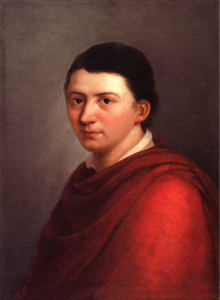The girl
(Poet's title: Das Mädchen)
Set by Schubert:
D 652
[February 1819]
Part of Schlegel: Abendröte (putative cycle)
Wie so innig, möcht ich sagen,
Sich der meine mir ergibt,
Um zu lindern meine Klagen,
Dass er nicht so innig liebt.
Will ich’s sagen, so entschwebt es;
Wären Töne mir verliehen,
Flöss’ es hin in Harmonien,
Denn in jenen Tönen lebt es.
Nur die Nachtigall kann sagen,
Wie er innig sich mir gibt,
Um zu lindern meine Klagen,
Dass er nicht so innig liebt.
I would say that the reason he seems so devoted,
My boyfriend, when he submits to me,
Is because he wants to stop me complaining,
But he does not love so devotedly.
Whenever I want to say it, the words float away;
If I had been gifted with music
It would all flow out in harmonies,
Because it lives in notes like that.
Only the nightingale can tell
How devotedly he gives himself to me,
Whether it is just to stop me complaining
Because he does not love so devotedly.
All translations into English that appear on this website, unless otherwise stated, are by Malcolm Wren. You are free to use them on condition that you acknowledge Malcolm Wren as the translator and schubertsong.uk as the source. Unless otherwise stated, the comments and essays that appear after the texts and translations are by Malcolm Wren and are © Copyright.
☙
Themes and images in this text:
Harmony Laments, elegies and mourning Nightingales, Philomel
The poet, Schlegel’s narrator in his Abendröte collection, claims that he can clearly hear the different voices of evening and night. Although they all speak for themselves, the resulting harmony can be perceived by the sensitive, poetic listener. The vast majority of the characters are seemingly confident about their message (the butterfly defends promiscuity, the traveller relishes onward movement etc.), but this girl is something of an exception. Her predominant tone is one of doubt.
She is confident that her own love for her boyfriend is real. It comes from deep within, it is ‘innig’. Yet somehow she cannot bring herself to believe his protestations. Is his own love equally inward and genuine? Is he just saying what I want to hear? How can I know if he is sincere? Am I being used (or even abused)?
The questions are not simply a result of the power disparities in a patriarchal system (though that is a crucial element in what makes them so agonising). They go to the heart of our understanding of what we can and cannot know about other people, our relationships with others and the differences between appearance and reality. These are the very issues that had become central to European philosophy after the work of Immanuel Kant. Schlegel was one of the leading thinkers of this post-Kantian generation, and, like others at the time, realised that it made no sense simply to address these questions in the form of discursive prose. If we can only know external phenomena and if ‘things in themselves’ (such as other people’s minds and motivations) are not fully accessible to us, we have to deal with the surface, with sensations, with impressions. Poetry and images might offer some sort of access to this deep (‘innig’) reality that seems to elude us. The girl, with all her doubts and uncertainties, is the voice of her whole generation.
☙
Original Spelling Das Mädchen. Wie so innig, möcht' ich sagen, Sich der meine mir ergiebt, Um zu lindern meine Klagen, Daß er nicht so innig liebt. Will ich's sagen, so entschwebt es; Wären Töne mir verliehen, Flöss' es hin in Harmonieen, Denn in jenen Tönen lebt es. Nur die Nachtigall kann sagen, Wie er innig sich mir giebt, Um zu lindern meine Klagen, Daß er nicht so innig liebt.
Confirmed by Peter Rastl with Schubert’s source, Musen-Almanach für das Jahr 1802. Herausgegeben von A. W. Schlegel und L. Tieck. Tübingen, in der Cotta’schen Buchhandlung, 1802, page 151; and with Friedrich Schlegel’s sämmtliche Werke. Erster Band. Gedichte. Berlin, bei Julius Eduard Hitzig, 1809, page 28.
To see an early edition of the text, go to page 151 Erstes Bild 161 here: https://download.digitale-sammlungen.de/BOOKS/download.pl?id=bsb10119478


